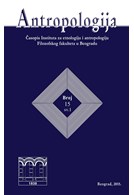EKSTREMNA HERMENEUTIKA TOMINOG JEVANĐELJA
Extreme Hermeneutics of Thomas’ Gospel
Author(s): Milan VukomanovićSubject(s): Culture and social structure , Sociology of Religion
Published by: Институт за етнологију и антропологију
Keywords: Gospel of Thomas; Gnosticism; Early Christianity; hermeneutics
Summary/Abstract: The main thesis of this article is that an appropriate interpretation of the Gospel of Thomas, one of the most important and most enigmatic non-canonical documents of Early Christianity, has not been thoroughly carried out without accepting a unique hermeneutical challenge of its pseudonymous author directed to his readers and followers. A true response to this interpretative challenge is a unique „extreme hermeneutics”, because in the incipit of the Gospel of Thomas, its appropriate interpretation has been announced as the matter of life and death. Therefore, a sort of verbal „distortion”, a meta-linguistic transformation or commitment to paradox appears as a mysterious key to revelation, i.e. as a way to reveal a great mystery deeply embedded in the structure of reality manifested by the ‘Living Jesus’. Like the Buddhist (Rinzai) Zen masters, who applied the koans in their practice, Thomas’ Jesus did something with his words. His profound, paradoxical proclamations perform a distinct performative-soteriological function, an effect partly produced by canonical gospels through their meta-linguistic techniques, such as miracles or ‘signs’. Finally, the author has pointed out the parallels with some other philosophical and religious teachings (Zen Buddhism, Advaita Vedanta, etc.) in which the Thomasine experience of awakening, i.e. the insight into the true character of a unique and indivisible nature of ultimate reality, has also been emphasized.
Journal: Antropologija
- Issue Year: 19/2019
- Issue No: 2
- Page Range: 95-108
- Page Count: 14
- Language: Serbian

